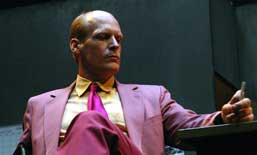
- San Francisco Chronicle February 14, 2020
- The Times of London May 10, 2012
- The New York Times December 16, 2010
- The New Yorker September 27, 2010
- New York Magazine October 6, 2010
- The New York Times October 6, 2010
- The New York Times February 5, 2010
- The Boston Globe May 15, 2009
- The Sydney Morning Herald December 28, 2009
- The Sydney Morning Herald May 19, 2009
- The Chicago Tribune November 17, 2008
- Time Out Chicago November 13-19, 2008
- Chicago Sun-Times November 15, 2008
- The Irish Times October 4, 2008
- The Independent October 3, 2008
- Irish Times September 29, 2008
- ArtForum: Best of 2007 December 1, 2007
- The New York Times Magazine December 9, 2007
- The New York Times September 16, 2007
- The Village Voice September 12-18, 2007
- The Bulletin September 4, 2007
- Publico July 4, 2007
- Klassekampen December 12, 2006
- Variety October 1, 2006
- Neue Zürcher Zeitung August 28, 2006
- Landboote August 28, 2006
- Tages-Anzeiger August 28, 2006
- The New York Times July 16, 2006
- Het Parool June 16,2006
- 8Weekly June 16, 2006
- Trouw June 16, 2006
- Walker Art Center interview June 8, 2006
- NRC Handelsblad June 2, 2006
- De Volkskrant May 29, 2006
- Le Soir May 24, 2006
- Yale Alumni Magazine November/December 2005
A Triumph Of Literature Over Time
Theater. “Gatz,” based on the novel “The Great Gatsby,” at the Festwochen: Seven and a Half Hours of Concentration.
by Anne-Catherine Simon
It’s twenty minutes to ten on the old clock in the office, as an employee whose computer isn’t working flips open a book and starts to read: F. Scott Fitzgerald’s “The Great Gatsby.” And it’s twenty minutes to ten on the clock when the last sentence of the novel comes, seven and a half hours later: “So we beat on, boats against the current, born back ceaselessly into the past.” Fitzgerald, they say, was obsessed with calendars and clocks, and so is his hero Jay Gatsby: he thinks he can turn back time, to before the moment when his great love Daisy married another man. When the story is over Daisy is gone, and he is dead.
Mix of Office World and Glamour World
“Gatz,” the experiment named after Gatsby’s actual name, by the New York company Elevator Repair Service, was conceived with the intention of telling the story word for word as Fitzgerald wrote it. The idea was to bring the novel to the stage and yet keep the novel intact. The result was on view Saturday at the Vienna Festival. What you could experience during this half-day in Hall G of the Vienna Museum District was more than a good story well told; it was an almost palpable triumph of literature. And indeed over precisely what defeated Fitzerald’s hero: time.
Time that at first grows longer and longer, more and more tiresome. Like the out-loud reading of the office employee, forced into idleness by his computer problem — the coworkers react peeved, alienated. He reads on, and soon something happens in the office that’s not quite right — one woman is practicing golf swings, and a little later she starts speaking the part of Jordan Baker, the cool sportswoman, then the janitor becomes the broad-legged Tom Buchanan, Daisy’s husband, and so on, until the boss is transformed into Gatsby. Director John Collins makes use of the comic possibilities that arise out of mixing the gray office world with the glamour world of the novel, out of the clash of theater and reading; he sprinkles the performance with whimsical gags but stays minimalistic, plays around the reading only so much, so that the text remains in the center. Gatsby’s pink suit is the most ostentatious accessory; the file cabinets remain, whether the characters attend parties at Gatsby’s mansion on Long Island or get drunk in a hotel, whether Buchanan’s mistress Mrs. Wilson is run over in the road by Daisy or Mrs. Wilson’s husband shoots Gatsby in the swimming pool. Just as sparing is the acoustic support, with squealing brakes, chirping crickets, or jazz out of the “Roaring Tewnties” in which the novel takes place.
A Last Sit Together
Not everyone makes it through. After three and a half hours of listening — to English with a strong American flavor — and an hour break, the audience is a bit thinner, and also partly swapped: to alleviate the daunting effect of the show’s duration, “Gatz” has been divided into two parts, with tickets sold separately for each. But most people stay from begining to end — and are rewarded. When Gatsby, who has already lost Daisy but won’t believe it’s true, and the narrator Nick sit together one last time — a completely still section — you can’t hear the slightest creak among the theater seats; there is no more office, only the invisible house on Long Island, the gray-golden morning light and the ghostly birds beginning to sing among the blue leaves.
Something has changed in the last hours: it’s a feeling like in the Marathon, you have forced yourself to keep running, and suddenly you reach the point where you no longer think about stopping and you want to keep running forever. When the performance is over time isn’t standing still anymore, but no one seems to be in a hurry. One voice in the auditorium spoke out what many were thinking: “A real gift.”